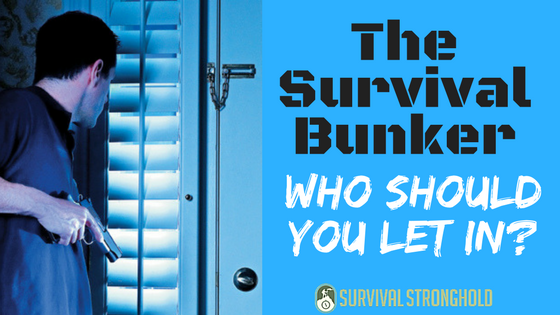You’ve probably run plenty of drills and scenarios in your mind. Financial collapse, natural disaster, civil unrest, or martial law set in–how can you keep your family safe?
Hopefully, you have your plan-of-action and supplies ready, but do you know how you’ll maintain your situation in post-disaster chaos? Specifically, what do you do when folks start knocking on your bunker door? This aspect of the SHTF scenario is unavoidable, and your approach could mean the difference between saving a life or risking your own. Let’s take a quick look at who to let in, who to turn away, and why:
Family
At first thought, you might think, “I would never turn my back on my own family!” Noble, for sure, but you need to consider how quickly, and by how much, that guest list can grow. Mom, dad, sister, brother, maybe even your grandparents, aunts, uncles, cousins, their kids…the list goes on.
You may love these people dearly, but are you prepared to take them in, feed them, clothe them, give them water and access to your resources?
Say you’ve made your preparations for your own immediate family of four people to have six months worth of food, water, and supplies. Then, Mom, Dad, and others show up. What was six months for your family becomes only weeks of resources for everyone.
But you don’t have to be cold-hearted in order to prepare for this scenario. Do your best now to encourage the people in your family to begin developing food and water reserves or learning useful skills. Talk to them, and explain you won’t be able to take care of everyone and protect your own spouse and children as well. This alone could give you great insight into their usefulness in a survival situation.
Friends
If you’re like me, you may be closer with some of your friends than you are with much of your family. It would be difficult to turn away a long-time buddy in a disaster. You are very likely to know your friends, their habits, their mindset much better and be able to determine what they might bring to the table in a survival situation.
If your friend shares the same interest in developing survival skills, it’s a no-brainer. You will want the extra pair of hands around. For instance, if you are the only one in your family who currently has a skill such as trapping or shooting, what happens if you get sick or injured? Having a wingman with the right skills, resources, or even just the right attitude can make all the difference in your survival.
Neighbors
Your neighbors may actually beat friends or family to your doorstep when disaster strikes, and as such, they’ll likely be your first test when it comes to deciding who goes and who stays.
You may get along great with your neighbors or you may have had a blood feud for the last decade, but this is irrelevant. Again, what’s important here are the resources, skills, and attitudes that they will bring to the situation. Your neighbor with the noisy dog might be a skilled hunter or mechanic, while your block-party buddy might be prone to panic or be too big of a drain on resources.
Now is the time to start preparing for this eventuality. If your neighbor ever peeks over the fence and asks about your garden, water barrels, or security cameras, having small conversations can give you big insight on your neighbor’s mindset and skills for future reference.
Strangers
Many of you might already plan to take the “shoot on sight” approach for anyone who isn’t a friend, family member, or neighbor. There may be an alternative situation, that could make you question your initial response and perhaps let them in after all.
Picture this scenario: a man, his wife, and their small child come around after they see you grabbing last minute stuff from the garage. The man tells you their home was burnt down by rioters and looters and he asks if he can hole up in your place. His wife and child are in their truck; you look and notice that the bed is full with containers, backpacks and camping gear. You can see he has a rifle on his shoulder and a pistol in his belt, but he has his hands raised, so he clearly means no harm. He goes on to tell you that they’ve packed away their own supplies for a rainy day and that their only real need is shelter.
What would you do? If you’d still turn them away on the spot, that’s your right, but here’s what I’d do. I’d ask him a little more about his preparations and about how long he estimates his supplies will last his family. Last, but not at all least, I’d ask to meet his kid and ask him some simple questions about mommy and daddy and what happened to their house. Kids are terrible liars, and this simple step can give you tremendous insight as to whether or not their story is true. You can also get a feeling for how scared he is, what he/she has seen and other little signs.
Honestly, whether a person or family shows up looking to join forces or totally empty-handed, if you can safely have a quick conversation before turning them away, I highly recommend doing so. Even if a person has no tangible resources to provide, you may find that they have incredibly valuable skills you wouldn’t want to go without.
The saying is true that there is safety in numbers. It may not be ideal or realistic to think that just you, your wife, and your kids can survive and fend off the real bad guys when things really go south. You definitely should consider these things before taking the “shoot first, ask questions later” approach. Take the time now to plan for these possibilities–it could make all the difference in your survival.
If you liked this, you might also enjoy…
This video has left me speechless!Because it shows God’s plan unfolding before us…I promise, you’ll never be the same.Ready to see… and believe?=> Just click here now |


